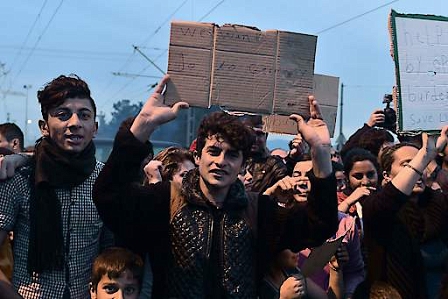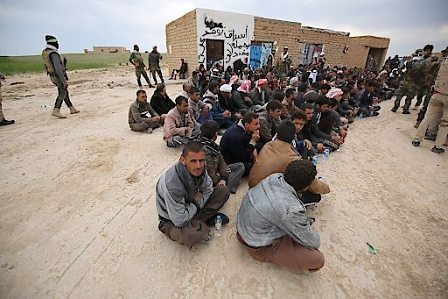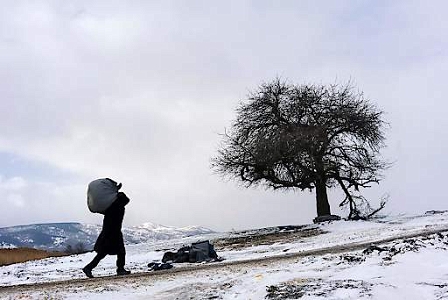Erstellt am: 14. 4. 2016 - 16:26 Uhr
Iraq "may soon reach a point beyond repair."
FM4 Reality Check
Hear the programme in the FM4 Player or subscribe to the podcast and get the whole programme after the show
Last year more than one hundred thousand Iraqis came to Europe seeking protection. That was ten times the figure for 2014.
Iraq is facing an economic crisis and more than 8 million people need humanitarian assistance. It's also facing a military crisis, and 3.3 million people have been forced to leave their homes. That’s nearly 10 per cent of the population.
A new report says that without a coherent strategy to help, Iraq "may soon reach a point beyond repair."

AFP/LOUISA GOULIAMAKI
Mark Lattimer is the executive director of the Minority Rights Group, which co-published the report. He described the situation in Iraq as “dire” and told Reality Check why the situation is so difficult:
One has always to emphasise the terrible nature of the violations committed by ISIS, but also to remind people that it isn’t just ISIS who are committing violations. Most of the people who have been killed in Iraq since the invasion in 2003 haven’t been killed by ISIS, and the parties to the conflict, including those responsible for gross human rights violations and violations of the laws of war include Iraqi government forces, as well as increasingly a lot of Shia militias, called "popular mobilisation forces" by the government. In practice they are armies run by different Shia organisations in Iraq and they themselves are responsible for very serious violations: killings, murders, forcible displacements.
It isn’t just a black and white picture, as it is often portrayed in the European media. I think you have to realise that the dynamics on the ground are very complex: if ISIS is pushed back from an area, you would hope that the people who were displaced from those provinces would be able to go back. But in practice that’s happening only to a very small degree, it’s happening very slowly.
The plight of the "internally displaced"
One of the problems is that the forces that now hold those areas retaken from ISIS are simply unable to guarantee the security of the displaced people when they return. This might be because of sectarian animosity: because many of them are Sunnis, the surrounding Shia population may distrust them, the Shia militias may regard it as an opportunity for them to gain more ground for the Shia population, so this kind of demographic "engineering" is now happening throughout Iraq and is making the division of the country evermore difficult to reverse.
We’ve seen many cases of whole communities who have been repeatedly displaced. They have been forced out of their homes and they’ve taken shelter somewhere. They haven’t been able to stay because of animosity around them. They’ve tried to come back, they’ve been displaced again, we see a population that has repeatedly been forced to flee.
No papers, no services
Many people are forced to flee their homes very quickly and can’t always take their papers with them. Actually in many cases you see that internally displaced people were reluctant to carry their IDs because often IDs have been used at check points to try and determine whether the holder is a Shia or a Sunni, and that can lead to instant consequences. There are thousands of cases of people being killed at checkpoints because they were perceived to be Sunni or Shia.

AFP / AHMAD AL-RUBAYE
So for that reason sometimes when they flee, Iraqis have decided to leave their IDs at home. That then gives them a huge problem when they get somewhere a little bit safer, and need to regularise their situation – they need and ID to access any kind of state support. At the same time local police forces are mistrustful of them because they are not sure who they are, so their problems in displacement are compounded.
If you want to understand some of the root causes of Europe’s refugee crisis as well as the refugee crisis in the region you only have to look at what’s happening in Iraq. Nearly all the Iraqis I speak to would never have dreamt of leaving their country even a relatively short time ago, but increasingly they’re feeling they have not choice because they have no home or a denied a future in their own country.
The international community
When you see Iraq represented at the United Nations, as I do from time to time, what you often see from other state delegations is an enormous sympathy for what the Iraqis are facing. The scale of the problems they are facing is overwhelming. But at the same time, many of the solutions that they are seeking to overcome those problems are in fact, if not making the problem worse, certainly establishing a very, very worrying situation for the future. This arming of local, irregular militia forces is probably the single most dangerous indication and bodes really badly for a democratic future for the country.
The international agencies who are still working in Iraq, for example the UN agencies - the refugee agency, the development agency - are simply not getting support that has been pledged at international donor conferences, as more and more money is being channelled into the situation of refugees in the region, in Turkey, in Jordan, in Lebanon and so forth. Not enough is getting its way to the countries, including Iraq, where the root problem lies. I think that is a big mistake – if Iraq isn’t getting the humanitarian assistance that has been pledged to it, that will only lead to problems further down the road.
If we’re going to address the terrible situation for civilians in Iraq, and also try and do something about the challenge posed by these very large migration flows, then I think we really have to address the root cause of the problem, and that is the situation for the 3.3 million displaced people within Iraq, and the 8 million who are in desperate need of humanitarian aid.

AFP / DIMITAR DILKOFF
FM4 Reality Check
Monday to Friday from 12.00 to 14.00, Saturday from 12.00 to 13.00, and after the show via Podcast or fm4.orf.at/realitycheck.



